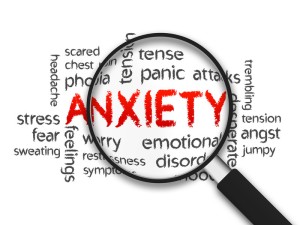 While I think I understand some of the root causes of my anxiety, understanding does not lead to its elimination. And that’s my problem. I’ve always felt that if I can just understand something, if I can get my head around a problem, if I can just organize the crap out of it, then I will be okay.
While I think I understand some of the root causes of my anxiety, understanding does not lead to its elimination. And that’s my problem. I’ve always felt that if I can just understand something, if I can get my head around a problem, if I can just organize the crap out of it, then I will be okay.
But all of that is just an attempt to control something that can’t be controlled. Or, rather, all of that is an attempt to chain anxiety with reason, to suppress instinct with rationality. It doesn’t work. I know that my anxiety is irrational, which is part of the reason that it is so uncomfortable.
But if my counselor and I are right (I have finished counseling for now, by the way), then my anxiety is just an emotional misreading of a particular situation or circumstance rooted in habits I learned a long time ago. And I’ve discovered that my entrenched response to my anxiety of frustration and anger is not particularly helpful.
But what is helpful is self-compassion. And self-love. And neither of these things force my anxiety to go away, but somehow when I give myself compassion I am better able to experience my anxiety without it being so uncomfortable.
But self-compassion–agreeing with the Holy Spirit within me that I am dearly loved by God–doesn’t just come because I will it. It, itself, is a fruit of discipline and intentional living.
* * *
Part of my spiritual journey has been the increasing embrace, over the last five years, of discipline. It started out as making my bed every morning, but it moved into morning and evening prayer, weekly writing rhythms, regular exercise, counting calories, reading spiritual works, and a few other things.
I have a strong moral and spiritual need for order, understanding my goal to be the alignment of my actions and my thoughts with virtue, the pursuit of the proper ordering of my life, by the power of the Holy Spirit, in accordance with the revealed will of God and with received tradition. Sickness, mental illness, crime, natural disaster–all of these things are problematic because they are the breakdown of order.
And anxiety does that to me. Anxiety disrupts my ordered inner life, resulting in a disruption of my outer life. Anxiety insists that the problem in front of me is more important than my daily habitus, more valuable than the maintenance of love and joy and affection. Anxiety works on me in such a way as to convince me to declare a state of emergency, to suspend the ordinary pattern of my life.
* * *
I’ve lived most of my life with the assumption (common to those of us in the West) that authenticity flows outward. You are what you feel, what you think. Your “real you” or “true self” is waiting to be discovered if you will just dig in deeper and deeper and deeper. Feelings are natural and therefore true.
We must feel in love to actually be in love. We must want to help those in need for our help to be authentic. If we are irritated or frustrated on the inside while perfectly calm and gracious on the outside, then we are not being genuine. Objective reality be damned, what matters is subjective thoughts and feelings.
Relatedly, then, you ought to conform your actions and words with what you feel in order to be authentic. If you don’t feel in love anymore with your spouse, then you should get divorced. If you always wanted to be [the thing you are not], then you are encouraged to leave [the things you do now] in order to pursue your authentic call.
(Incidentally, this is why homosexuality, transsexuality, and other non-normative sexualities are quickly becoming socially accepted (and why no-fault divorce, gluttony, and extramarital sex have long been socially accepted). If you feel something, then it would be inauthentic–wrong, in fact–to not act on it. Feelings are true whether or not they correspond to reality).
But this is just overly romantic essentialism. It’s the Cartesian self gone wild. A kind of Modern Gnosticism. Or, to put it another way, it is the nonsensical notion that my thoughts and feelings are truer than my words or actions. As I’ve discussed before, this is a complete reversal of ancient (specifically Aristotelian) anthropology. For Aristotle, you are what you do.
* * *
In the past when I have been beset by anxiety, I focus on trying to change my feelings, to not feel what I feel. And this makes sense with the model of the self I have sketched above.
But what I have discovered is that if I focus on getting everything right in my head before I try to align my actions and words with discipline and virtue, I end up working backwards. Because if Aristotle is right, then my actions and words make me who I am independent of what is in my head. And if the Christian narrative is right, then my thoughts and feelings are inherently disordered anyway.
Making my bed everyday (the first discipline I ever regularly employed) helped order my inner world by anchoring that world to habit. Praying every morning and every night, counting my calories every day, exercising regularly, getting up at 5 every morning to greet the dawn and read in darkness–all of these things, whether I feel it or not at the time anchor my inner world and provide a structure onto which I can properly graft my feelings.
In helping me properly order my loves and desires, my habitus helps me recognize God first and foremost and, as part of that recognition, actually feel compassion (inspired by the Spirit) for myself.
And anxiety, rooted in a lack of control of what I think and feel, becomes increasingly less important with every day that I choose love and virtue and holiness.

Leave a comment